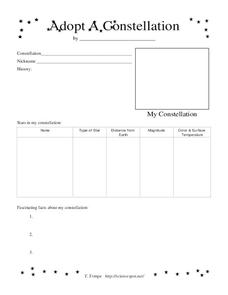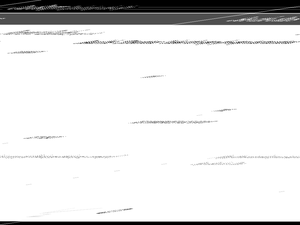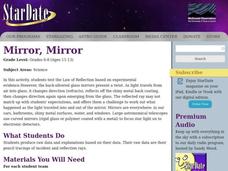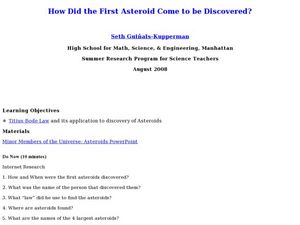Curated OER
How Do We Explore Strange Environments?
Young scholars identify and label the different parts of a robot, rover, or a spacecraft. They discuss and record all of the features their robot will need to accomplish its mission and be able to explain why they chose these features...
Curated OER
My Hometown
Learners identify the basic requirements needed for survival and identify the resouces needed for survival that are found within their own community. They use craft materials to create a model of it and then. create a color key to...
Curated OER
The Drake Equation
Students use the Drake Equation to calculate the probability of sustaining life on various planets. Through the use of the equation, they determine whether intelligent and advanced civilizations can be developed on planets other than...
Curated OER
The Universe
Students describe what scientists mean by an "expanding universe" in their own words. They explain how scientists comprehend the universie is expanding. Students comprehend the vast scale of the universe. They comprehend how theory...
Curated OER
The Mission of Lewis and Clark
Young scholars comprehend the various aspects of the Lewis and Clark expediton. They complete an idea web. Students work in small groups. They recall some important aspects of the Lewis and Clark expedition by performing the Corps of...
Curated OER
Adopt a Constellation
Students adopt a constellation and find detailed information about their constellation. For this constellation lesson plan, students use the web to find information about a constellation of their choice. They identify the history of the...
Curated OER
The Ancient Maya
Young scholars explore the culture of the Mayans through a variety of activities. In this lesson about Maya, students analyze pictures in books and on websites, produce scale models of Maya architecture, and create Maya mosaics. Young...
Curated OER
Blue Moon
Students explore information about the moon. In this trans-disciplinary lesson, students first listen to a picture book about the moon, then create an accompanying art project to illustrate a blue moon. Finally, the students write facts...
Curated OER
A Moon with a View
Third graders explore the rotation of Earth and the moon. In this solar system lesson, 3rd graders participate in an Earth and moon simulation in which part of the class "becomes" the sun, while other children represent the moon by...
Curated OER
See the Stars
Students explore the nighttime sky. In this space science lesson, students read the book Maria's Comet and and investigate the sky using their naked eyes. Students compare the view of their naked eyes to the view of a telescope.
Curated OER
Sweet Candy Comets
Fourth graders use candy to make a comet. In this lesson, 4th graders examine the role comets have played throughout history, students watch NASA videos about comets and complete the lesson by making an edible model of a comet. This...
Curated OER
What are Stars?
Young scholars research the solar system and it's characteristics. For this solar system lesson, students are broken into 4 groups, each assigned a specific part of the solar system. Young scholars use the Internet to research their...
Curated OER
Super Gelatin
Students measure angles of refraction as the light travels through gelatin. In this experimental lesson students complete a refraction lab and plot their data.
Curated OER
Spectroscope
Young scholars examine how to apply conservation of energy and properties of matter to a spectroscope. In this energy lesson plan students build their own spectroscope and observe three kinds of spectra.
Curated OER
Mirror, Mirror
Students investigate the Law of Reflection and how light travels. In this reflection lesson students produce data from their experiment then create a pencil tracing.
Curated OER
Follow the Falling Meteorite
Students use triangulation method to locate meteorite landing site on the map. In this earth science lesson, students participate in a meteorite treasure hunt set up by the teacher. They explain how this method is used by scientists to...
Curated OER
Energy: The Universal Currency
Science stars examine the concept of energy by thinking about everyday situations. The lesson plan is incohesive. It lists goals for the student, but doesn't address all of them in the content. The best use of this resource would simply...
Curated OER
an Explorative Journey Through the Solar System
Students, in groups, research a planet from our solar system. They create Styrofoam models of the planets and place the planets on a correct distance scale from the sun.
Curated OER
The Phases of the Moon
Students view an applet to study the phases of the Moon in relation to the orientation of the sun, moon, and Earth.
Curated OER
Our Home in the Milky Way
Young scholars gain appreciation of the vastness of our galaxy by viewing an applet about the Milky Way. Students hypothesize about how long it would take to get from Earth to Pluto.
Curated OER
Our Solar System to Scale
Middle schoolers calculate the diameter of planets and their relative distances. In this space science lesson, students discover how small or big the planets are in comparison to each other. Middle schoolers use cross multiplying...
Curated OER
How Did the First Asteroid Come to be Discovered?
Learners examine asteroids including how and when they were discovered. In this asteroid lesson plan students view a PowerPoint presentation on asteroids.
Curated OER
A Model of the Sun's interior
Young scholars create a three-dimensional model of the sun. In this solar system activity, students design a scale model of the sun using plasticine.
Curated OER
Using Star Charts and Maps
Students study star charts and describe locations of objects. In this scientific models lesson students use coordinates and identify characteristics.
Other popular searches
- Astronomy and Space Science
- Astronomy Vocabulary
- Planets and Astronomy
- Astronomy Activity
- Science Astronomy
- Ancient Astronomy
- Astronomy Lesson Plans
- History of Astronomy
- Space Science Astronomy
- Space and Astronomy
- Astronomy Navigation
- Astronomy History

























